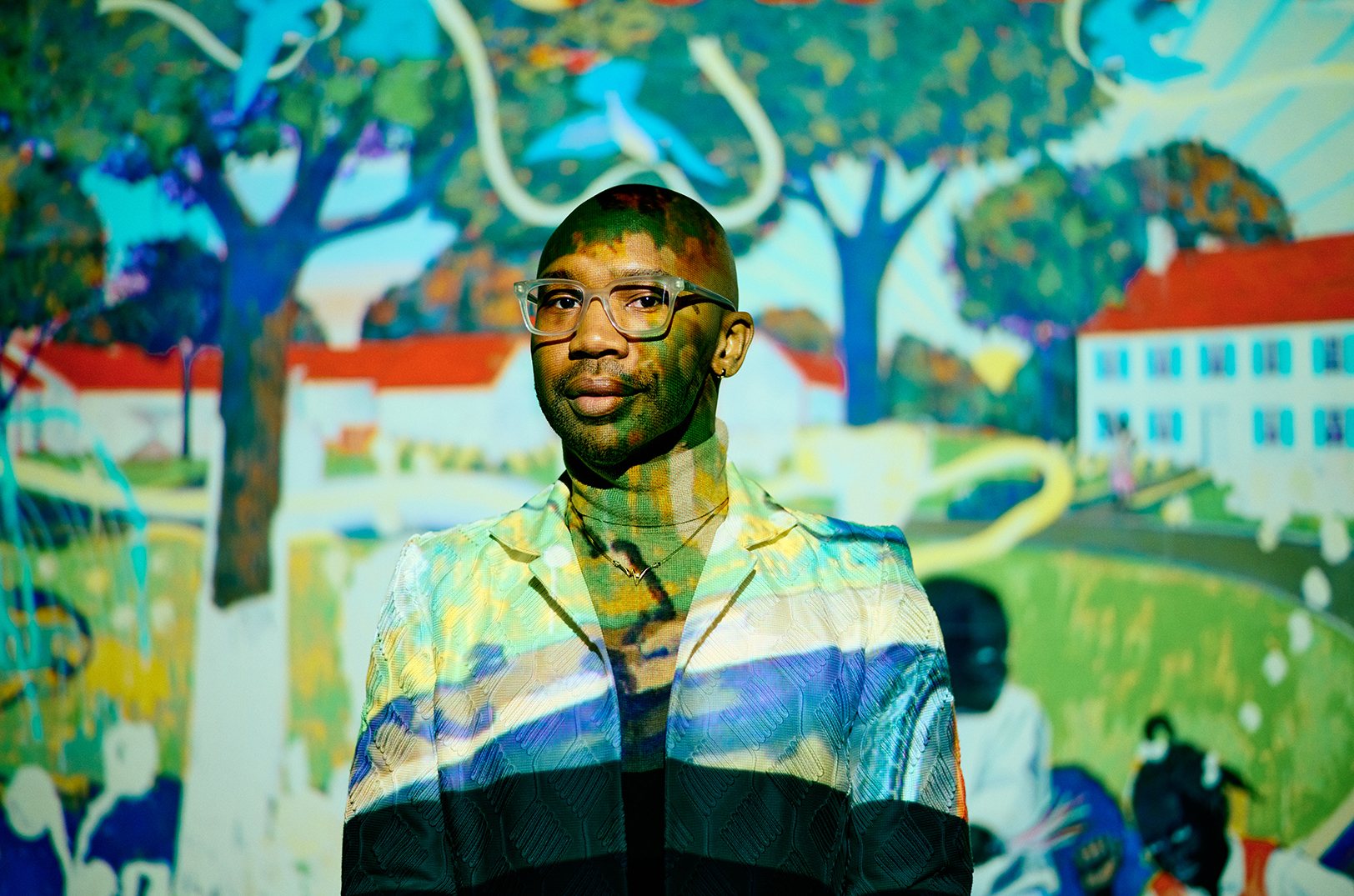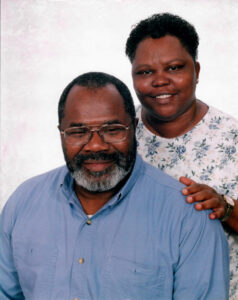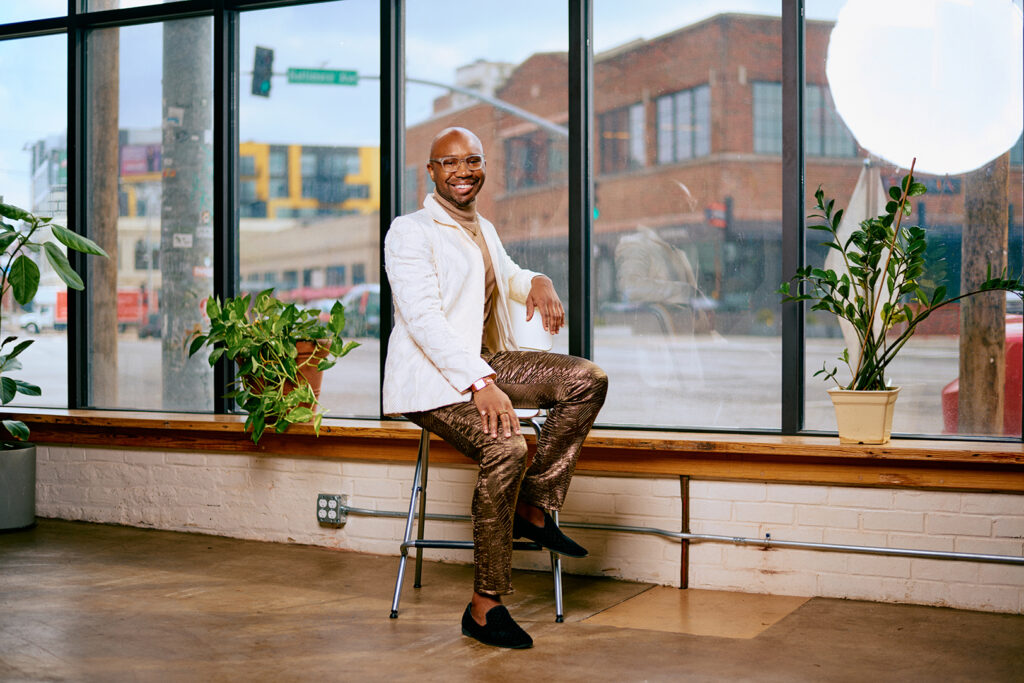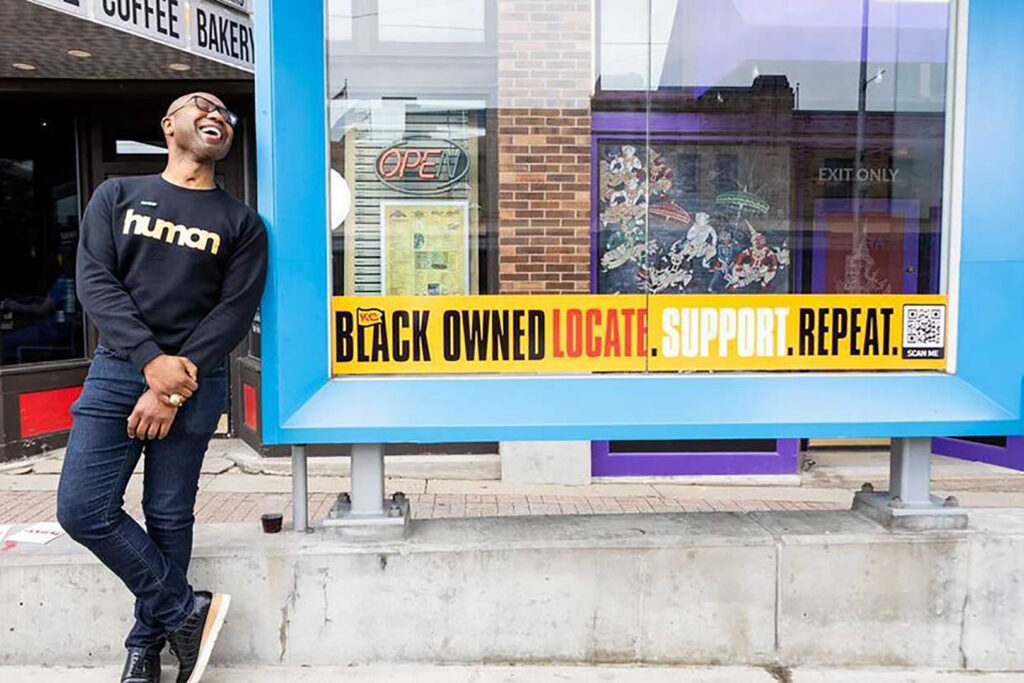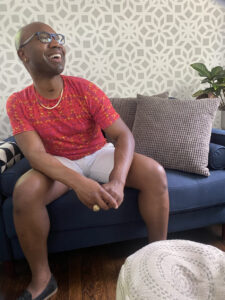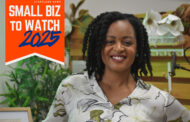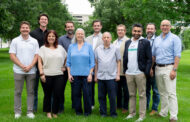Godfrey Riddle made it his mission to uplift others, the Kansas City social entrepreneur said, but when a new, high-profile Peacock series begins streaming next week, viewers will witness Riddle on the receiving end of that love and support.
The Civic Saint founder is set to appear on an episode of “The Gentle Art of Swedish Death Cleaning,” debuting Thursday, April 27 on NBC’s streaming platform.
Watch the trailer for “The Gentle Art Of Swedish Death Cleaning” then keep reading.
From executive producer Amy Poehler, the show features individuals recovering from trauma as they embark on the process of “Swedish death cleaning” — in other words, cleaning out their possessions so that loved ones aren’t forced to complete the cumbersome task after they die.
Riddle, whose parents passed away within a 14-month span from 2018 to 2019 as he battled a rare form of head and neck cancer, described his experience on the show as cathartic.
“It gave me the space to actually have someone hold up the tent poles in my life,” Riddle said. “That’s kind of how I visualized it.”
After going through cancer treatment, the passing of his parents, and the COVID-19 pandemic, Riddle said the death cleaning process finally allowed him the space and time to grieve.
“I just hadn’t gotten the time to just grieve and process it,” he said. “So having the death cleaners here, I said repeatedly — maybe even to them — that it was like having them hold things together so I could just step back and grieve.”
The death cleaning team includes three individuals — a designer, psychologist, and organizer — who help each person understand, and then release, their attachment to objects no longer useful to them, according to Riddle.
“It was way more cathartic, healing, positive, and educational than I thought it was going to be,” Riddle said. “I left surprised in the best possible way, and just really deeply appreciative, that these three humans … would just even take the time to come sit with me for days and work through all of that.”
From skeptic to believer
Show officials first reached out to Riddle in January 2022, he said, after learning about his personal story and the founding of Civic Saint, an apparel company that features affirming designs and donates a portion of each sale to organizations that fight for racial and social equity.
READ MORE: Civic Saint: How life-threatening setbacks inspired company built on universal humanity, survival
Riddle was initially skeptical, he admitted, but became convinced to participate as he realized that the show’s mission mirrored his own: to help people.
“That’s what got me to say yes, because I don’t necessarily care to be a reality TV personality,” Riddle said. “But I only said yes because every time we talked about the goal of the show, it was about helping people deal with this.”
Riddle’s death cleaning experience and filming took place nearly a year ago, he shared, and he’s already seen how that has inspired some of his loved ones to do the same.
“A few of my friends went home and began death cleaning that afternoon,” Riddle said. “One friend who had also lost his mother had a pile of stuff in his basement that he actively avoided.”
“He would not go to that corner unless he needed something super specific, and he was in and out like a strike team,” he continued. “But it made him realize that this was a chance for him to have to go through that process.”
Riddle hopes the show will have that effect on its viewers, so they can enjoy the same cathartic experience he did.
“That’s what I want other people to see when they see my episode, or other episodes of this show, or even just learn about the concept,” he said. “I hope that they’ll think about how it might be useful to them in their lives.”
Time to move on
The Swedish death cleaning process not only allowed Riddle some closure, but also allowed him to open new doors, he said.
“I really do feel like it’s given me the capacity to start thinking about life moving forward,” Riddle said. “It does feel like the end of a chapter of my life just coming to a close, and in a good way.”
“That grief will be with me and those memories will be with me every day of my life going forward, but they don’t have to define me entirely,” he added. “They don’t have to be the point at which my story stops or the narrative stops.”
Riddle recalled a conversation with the show’s psychologist as a “turning point” in how he contextualized his grief.
“There was one part of our time together where we really got to sit down and talk about how you can live with that grief state as part of your identity, and also just how you can let others into that experience with you,” he said. “You don’t have to do it all alone by yourself. Yes, sometimes you do need those independent moments of solace and processing, but it’s OK to share that grief state with others.”
One way that Riddle was able to share that grief through the show was by bringing together his close friends to share their memories of his parents, something he said he had only done at their memorial services.
“It was really great, because we got to go around and I got to hear stories of my parents and how my friends saw them and interacted with them,” Riddle said. “They each shared one memory, and that was really touching for me because I hadn’t really gotten to do that since everything had happened.”
“Whenever I think about the experience, that is one of the first thoughts that comes to mind, and just how amazing that was,” he added.
Memories aren’t contained in objects
Parting with and giving away some of his parents’ former possessions also proved a challenge worth embracing, Riddle said.
“I only saw the sadness or the remorse in letting these things go,” he said. “It literally felt like getting rid of these items was in some way getting rid of parts of my parents’ story or their memory — or even parts of my story — and that’s absolutely not the case.”
Riddle recalled that at a point during the process, he was able to let go of control and understand that his connection with his parents extends far beyond physical items and mementos.
“I could give away literally everything that they had ever touched, or owned, or even thought about on this earth, and it wouldn’t in any way, shape, or form mean losing one ounce of their memory or their love that they had for me, and I for them,” Riddle said.
“My parents are with me every day in every way and on every step of my journey, and I can be with them whenever I want, no matter where I am,” he continued.
That lesson was Riddle’s biggest takeaway from death cleaning, he said.
“That’s a really important part of death cleaning that I wasn’t expecting,” Riddle said. “I thought it would solely be about the objects, but it really just taught me how to keep their memory alive.”
He hopes that everyone will implement death cleaning in their own lives, so that they can enjoy the benefits during life, and leave a legacy beyond death.
“I think death cleaning is for everyone because we’re all going to die eventually,” Riddle said. “Knowing that, I think it’s really important to step back and think about the life you want to live — what’s your purpose and the legacy you want to leave behind?”
“I hope that people watch and find it helpful,” he added. “I just really want this to spark a dialogue in their own lives … and inspire them to live life as they see fit, and in a way that creates meaning, love, and legacy.”



